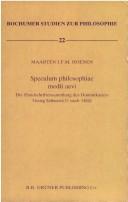| Listing 1 - 3 of 3 |
Sort by
|

ISBN: 9060323408 9786613328021 128332802X 9027276773 9789027276773 9789060323403 Year: 1994 Volume: 22 Publisher: Amsterdam Philadelphia B.R. Grüner
Abstract | Keywords | Export | Availability | Bookmark
 Loading...
Loading...Choose an application
- Reference Manager
- EndNote
- RefWorks (Direct export to RefWorks)
Das 15. Jahrhundert gehört zu den am wenigsten erforschten Epochen des mittelalterlichen Denkens, obwohl diese Periode für unser Verständnis der Wende vom Mittelalter zur Neuzeit von große Bedeutung ist. Es verfestigten sich innerhalb der Scholastik Strömungen und Schulen wie der Thomismus, der Albertismus und der Nominalismus, welche die philosophische Landschaft bis Kant maßgebend mitbestimmt haben. Um den Hintergrund, vor dem sich diese Entwicklung vollzogen hat, in seiner Dynamik zu verstehen, ist es notwendig, daß wir ein genaues Bild gewinnen von der Philosophie und Theologie, wie sie am
Filosofie [Middeleeuwse ] --- Medieval philosophy --- Middeleeuwse filosofie --- Philosophie médiévale --- Philosophy [Medieval ] --- 091 <017.2 SCHWARTZ, GEORG> --- Philosophy, Medieval --- Religious thought --- -Medieval philosophy --- Scholasticism --- Religion --- 091 <017.2 SCHWARTZ, GEORG> Handschriftenkunde. Handschriftencatalogi--Private verzamelingen--SCHWARTZ, GEORG --- Handschriftenkunde. Handschriftencatalogi--Private verzamelingen--SCHWARTZ, GEORG --- Schwartz, Georg --- Church history --- Theology, Doctrinal --- History --- Schwartz, Georg, --- Middle Ages, 600-1500 --- Middle Ages, 500-1500 --- Philosophy, Medieval.
Book
ISBN: 9789004272422 9789004272439 9004272437 132220005X 9004272429 Year: 2015 Publisher: Leiden, Netherlands
Abstract | Keywords | Export | Availability | Bookmark
 Loading...
Loading...Choose an application
- Reference Manager
- EndNote
- RefWorks (Direct export to RefWorks)
Marsilius of Inghen’s Sentences Commentary is a crucial piece of evidence in the history of thought between Ockham and Luther, covering almost the complete range of items important in pre-modern philosophy and theology. The part edited here is concerned with the Trinity, dealing with the unity and the distinction of the divine persons. It addresses the use of logic in theology, the dialectics between authority and reason, and reveals new evidence on the debates between Realists and Nominalists at the Universities of Paris and Heidelberg. The present edition provides the reader a first critical text based on an assessment of all textual witnesses, thus offering an indispensable tool for uncovering the intricacies of Scholasticism at the eve of Reformation.
Book
ISBN: 9461662009 9789461662002 9789462700635 946270063X Year: 2016 Publisher: Leuven
Abstract | Keywords | Export | Availability | Bookmark
 Loading...
Loading...Choose an application
- Reference Manager
- EndNote
- RefWorks (Direct export to RefWorks)
The commentary of the Italian physician and philosopher Pietro d'Abano on Bartholomew of Messina's Latin translation of Pseudo-Aristotle's 'Problemata Physica', published in 1310, constitutes an important historical source. In a section of the corpus Aristotelicum that was not part of the standard curriculum at the medieval university, the commentary of Pietro d'Abano investigates the complex relationship between text, translation, and commentary. The eight articles in this volume provide valuable insights into the manner in which Pietro d'Abano deals with the problems of a translated text. They emphasize the idiosyncrasy of his approach in comparison to his contemporaries and successors, the particularities of his commentary in light of the habitual exegetical practices applied in the teaching of curricular texts, as well as the influence of philosophical traditions outside the strict framework of the medieval arts faculty.
Philosophy, Medieval. --- Medicine, Medieval. --- Medicine, Medieval --- Medieval medicine --- Medieval philosophy --- Scholasticism --- Petrus, --- Aban, Pierre d', --- Abano, Peter de, --- Abano, Pietro d', --- Abanus, Petrus, --- Abbano, Petrus de, --- Albano, Petrus de, --- De Abano, Petrus, --- Ebano, Petrus de, --- Peter, --- Pierre, --- Pietro, --- Problemata physica. --- Problemata Aristotelis --- Φυσικὰ προβλήματα --- Physika problēmata --- Προβλήματα --- Problēmata (Attributed to Aristotle)
| Listing 1 - 3 of 3 |
Sort by
|

 Search
Search Feedback
Feedback About UniCat
About UniCat  Help
Help News
News